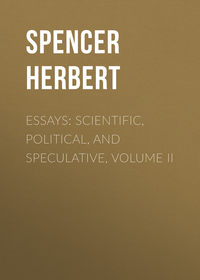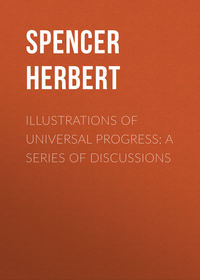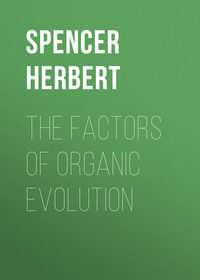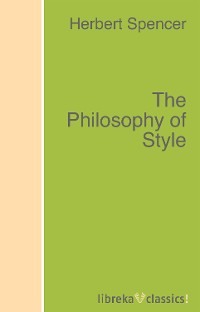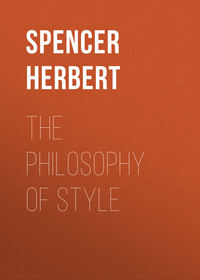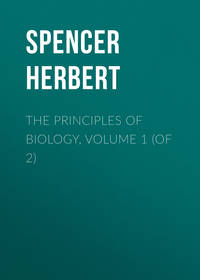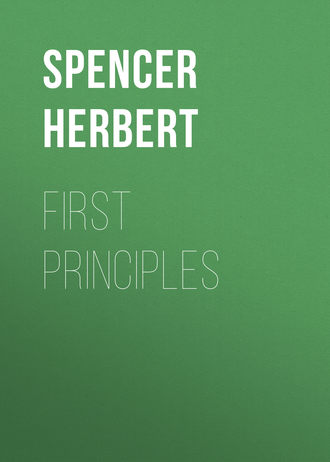 полная версия
полная версияFirst Principles
Thus these three different suppositions respecting the origin of things, verbally intelligible though they are, and severally seeming to their respective adherents quite rational, turn out, when critically examined, to be literally unthinkable. It is not a question of probability, or credibility, but of conceivability. Experiment proves that the elements of these hypotheses cannot even be put together in consciousness; and we can entertain them only as we entertain such pseud-ideas as a square fluid and a moral substance – only by abstaining from the endeavour to render them into actual thoughts. Or, reverting to our original mode of statement, we may say that they severally involve symbolic conceptions of the illegitimate and illusive kind. Differing so widely as they seem to do, the atheistic, the pantheistic, and the theistic hypotheses contain the same ultimate element. It is impossible to avoid making the assumption of self-existence somewhere; and whether that assumption be made nakedly, or under complicated disguises, it is equally vicious, equally unthinkable. Be it a fragment of matter, or some fancied potential form of matter, or some more remote and still less imaginable cause, our conception of its self-existence can be formed only by joining with it the notion of unlimited duration through past time. And as unlimited duration is inconceivable, all those formal ideas into which it enters are inconceivable; and indeed, if such an expression is allowable, are the more inconceivable in proportion as the other elements of the ideas are indefinite. So that in fact, impossible as it is to think of the actual universe as self-existing, we do but multiply impossibilities of thought by every attempt we make to explain its existence.
§ 12. If from the origin of the Universe we turn to its nature, the like insurmountable difficulties rise up before us on all sides – or rather, the same difficulties under new aspects. We find ourselves on the one hand obliged to make certain assumptions; and yet on the other hand we find these assumptions cannot be represented in thought.
When we inquire what is the meaning of the various effects produced upon our senses – when we ask how there come to be in our consciousness impressions of sounds, of colours, of tastes, and of those various attributes which we ascribe to bodies; we are compelled to regard them as the effects of some cause. We may stop short in the belief that this cause is what we call matter. Or we may conclude, as some do, that matter is only a certain mode of manifestation of spirit; which is therefore the true cause. Or, regarding matter and spirit as proximate agencies, we may attribute all the changes wrought in our consciousness to immediate divine power. But be the cause we assign what it may, we are obliged to suppose some cause. And we are not only obliged to suppose some cause, but also a first cause. The matter, or spirit, or whatever we assume to be the agent producing on us these various impressions, must either be the first cause of them or not. If it is the first cause, the conclusion is reached. If it is not the first cause, then by implication there must be a cause behind it; which thus becomes the real cause of the effect. Manifestly, however complicated the assumptions, the same conclusion must inevitably be reached. We cannot think at all about the impressions which the external world produces on us, without thinking of them as caused; and we cannot carry out an inquiry concerning their causation, without inevitably committing ourselves to the hypothesis of a First Cause.
But now if we go a step further, and ask what is the nature of this First Cause, we are driven by an inexorable logic to certain further conclusions. Is the First Cause finite or infinite? If we say finite we involve ourselves in a dilemma. To think of the First Cause as finite, is to think of it as limited. To think of it as limited, necessarily implies a conception of something beyond its limits: it is absolutely impossible to conceive a thing as bounded without conceiving a region surrounding its boundaries. What now must we say of this region? If the First Cause is limited, and there consequently lies something outside of it, this something must have no First Cause – must be uncaused. But if we admit that there can be something uncaused, there is no reason to assume a cause for anything. If beyond that finite region over which the First Cause extends, there lies a region, which we are compelled to regard as infinite, over which it does not extend – if we admit that there is an infinite uncaused surrounding the finite caused; we tacitly abandon the hypothesis of causation altogether. Thus it is impossible to consider the First Cause as finite. And if it cannot be finite it must be infinite.
Another inference concerning the First Cause is equally unavoidable. It must be independent. If it is dependent it cannot be the First Cause; for that must be the First Cause on which it depends. It is not enough to say that it is partially independent; since this implies some necessity which determines its partial dependence, and this necessity, be it what it may, must be a higher cause, or the true First Cause, which is a contradiction. But to think of the First Cause as totally independent, is to think of it as that which exists in the absence of all other existence; seeing that if the presence of any other existence is necessary, it must be partially dependent on that other existence, and so cannot be the First Cause. Not only however must the First Cause be a form of being which has no necessary relation to any other form of being, but it can have no necessary relation within itself. There can be nothing in it which determines change, and yet nothing which prevents change. For if it contains something which imposes such necessities or restraints, this something must be a cause higher than the First Cause, which is absurd. Thus the First Cause must be in every sense perfect, complete, total: including within itself all power, and transcending all law. Or to use the established word, it must be absolute.
Here then respecting the nature of the Universe, we seem committed to certain unavoidable conclusions. The objects and actions surrounding us, not less than the phenomena of our own consciousness, compel us to ask a cause; in our search for a cause, we discover no resting place until we arrive at the hypothesis of a First Cause; and we have no alternative but to regard this First Cause as Infinite and Absolute. These are inferences forced upon us by arguments from which there appears no escape. It is hardly needful however to show those who have followed thus far, how illusive are these reasonings and their results. But that it would tax the reader’s patience to no purpose, it might easily be proved that the materials of which the argument is built, equally with the conclusions based on them, are merely symbolic conceptions of the illegitimate order. Instead, however, of repeating the disproof used above, it will be desirable to pursue another method; showing the fallacy of these conclusions by disclosing their mutual contradictions.
Here I cannot do better than avail myself of the demonstration which Mr Mansel, carrying out in detail the doctrine of Sir William Hamilton, has given in his “Limits of Religious Thought.” And I gladly do this, not only because his mode of presentation cannot be improved, but also because, writing as he does in defence of the current Theology, his reasonings will be the more acceptable to the majority of readers.
§ 13. Having given preliminary definitions of the First Cause, of the Infinite, and of the Absolute, Mr Mansel says: —
“But these three conceptions, the Cause, the Absolute, the Infinite, all equally indispensable, do they not imply contradiction to each other, when viewed in conjunction, as attributes of one and the same Being? A Cause cannot, as such, be absolute: the Absolute cannot, as such, be a cause. The cause, as such, exists only in relation to its effect: the cause is a cause of the effect; the effect is an effect of the cause. On the other hand, the conception of the Absolute implies a possible existence out of all relation. We attempt to escape from this apparent contradiction, by introducing the idea of succession in time. The Absolute exists first by itself, and afterwards becomes a Cause. But here we are checked by the third conception, that of the Infinite. How can the Infinite become that which it was not from the first? If Causation is a possible mode of existence, that which exists without causing is not infinite; that which becomes a cause has passed beyond its former limits.” * * *
“Supposing the Absolute to become a cause, it will follow that it operates by means of freewill and consciousness. For a necessary cause cannot be conceived as absolute and infinite. If necessitated by something beyond itself, it is thereby limited by a superior power; and if necessitated by itself, it has in its own nature a necessary relation to its effect. The act of causation must therefore be voluntary; and volition is only possible in a conscious being. But consciousness again is only conceivable as a relation. There must be a conscious subject, and an object of which he is conscious. The subject is a subject to the object; the object is an object to the subject; and neither can exist by itself as the absolute. This difficulty, again, may be for the moment evaded, by distinguishing between the absolute as related to another and the absolute as related to itself. The Absolute, it may be said, may possibly be conscious, provided it is only conscious of itself. But this alternative is, in ultimate analysis, no less self-destructive than the other. For the object of consciousness, whether a mode of the subject’s existence or not, is either created in and by the act of consciousness, or has an existence independent of it. In the former case, the object depends upon the subject, and the subject alone is the true absolute. In the latter case, the subject depends upon the object, and the object alone is the true absolute. Or if we attempt a third hypothesis, and maintain that each exists independently of the other, we have no absolute at all, but only a pair of relatives; for coexistence, whether in consciousness or not, is itself a relation.”
“The corollary from this reasoning is obvious. Not only is the Absolute, as conceived, incapable of a necessary relation to anything else; but it is also incapable of containing, by the constitution of its own nature, an essential relation within itself; as a whole, for instance, composed of parts, or as a substance consisting of attributes, or as a conscious subject in antithesis to an object. For if there is in the absolute any principle of unity, distinct from the mere accumulation of parts or attributes, this principle alone is the true absolute. If, on the other hand, there is no such principle, then there is no absolute at all, but only a plurality of relatives. The almost unanimous voice of philosophy, in pronouncing that the absolute is both one and simple, must be accepted as the voice of reason also, so far as reason has any voice in the matter. But this absolute unity, as indifferent and containing no attributes, can neither be distinguished from the multiplicity of finite beings by any characteristic feature, nor be identified with them in their multiplicity. Thus we are landed in an inextricable dilemma. The Absolute cannot be conceived as conscious, neither can it be conceived as unconscious: it cannot be conceived as complex, neither can it be conceived as simple: it cannot be conceived by difference, neither can it be conceived by the absence of difference: it cannot be identified with the universe, neither can it be distinguished from it. The One and the Many, regarded as the beginning of existence, are thus alike incomprehensible.”
“The fundamental conceptions of Rational Theology being thus self-destructive, we may naturally expect to find the same antagonism manifested in their special applications. * * * How, for example, can Infinite Power be able to do all things, and yet Infinite Goodness be unable to do evil? How can Infinite Justice exact the utmost penalty for every sin, and yet Infinite Mercy pardon the sinner? How can Infinite Wisdom know all that is to come, and yet Infinite Freedom be at liberty to do or to forbear? How is the existence of Evil compatible with that of an infinitely perfect Being; for if he wills it, he is not infinitely good; and if he wills it not, his will is thwarted and his sphere of action limited?” * * *
“Let us, however, suppose for an instant that these difficulties are surmounted, and the existence of the Absolute securely established on the testimony of reason. Still we have not succeeded in reconciling this idea with that of a Cause: we have done nothing towards explaining how the absolute can give rise to the relative, the infinite to the finite. If the condition of casual activity is a higher state than that of quiescence, the Absolute, whether acting voluntarily or involuntarily, has passed from a condition of comparative imperfection to one of comparative perfection; and therefore was not originally perfect. If the state of activity is an inferior state to that of quiescence, the Absolute, in becoming a cause, has lost its original perfection. There remains only the supposition that the two states are equal, and the act of creation one of complete indifference. But this supposition annihilates the unity of the absolute, or it annihilates itself. If the act of creation is real, and yet indifferent, we must admit the possibility of two conceptions of the absolute, the one as productive, the other as non-productive. If the act is not real, the supposition itself vanishes.” * * *
“Again, how can the relative be conceived as coming into being? If it is a distinct reality from the absolute, it must be conceived as passing from non-existence into existence. But to conceive an object as non-existent, is again a self-contradiction; for that which is conceived exists, as an object of thought, in and by that conception. We may abstain from thinking of an object at all; but, if we think of it, we cannot but think of it as existing. It is possible at one time not to think of an object at all, and at another to think of it as already in being; but to think of it in the act of becoming, in the progress from not being into being, is to think that which, in the very thought, annihilates itself.” * * *
“To sum up briefly this portion of my argument. The conception of the Absolute and Infinite, from whatever side we view it, appears encompassed with contradictions. There is a contradiction in supposing such an object to exist, whether alone or in conjunction with others; and there is a contradiction in supposing it not to exist. There is a contradiction in conceiving it as one; and there is a contradiction in conceiving it as many. There is a contradiction in conceiving it as personal; and there is a contradiction in conceiving it as impersonal. It cannot, without contradiction, be represented as active; nor, without equal contradiction, be represented as inactive. It cannot be conceived as the sum of all existence; nor yet can it be conceived as a part only of that sum.”
§ 14. And now what is the bearing of these results on the question before us? Our examination of Ultimate Religious Ideas has been carried on with the view of making manifest some fundamental verity contained in them. Thus far however we have arrived at negative conclusions only. Criticising the essential conceptions involved in the different orders of beliefs, we find no one of them to be logically defensible. Passing over the consideration of credibility, and confining ourselves to that of conceivability, we see that Atheism, Pantheism, and Theism, when rigorously analysed, severally prove to be absolutely unthinkable. Instead of disclosing a fundamental verity existing in each, our investigation seems rather to have shown that there is no fundamental verity contained in any. To carry away this conclusion, however, would be a fatal error; as we shall shortly see.
Leaving out the accompanying moral code, which is in all cases a supplementary growth, every Religion may be defined as an à priori theory of the Universe. The surrounding facts being given, some form of agency is alleged which, in the opinion of those alleging it, accounts for these facts. Be it in the rudest Fetishism, which assumes a separate personality behind every phenomenon; be it in Polytheism, in which these personalities are partially generalized; be it in Monotheism, in which they are wholly generalized; or be it in Pantheism, in which the generalized personality becomes one with the phenomena; we equally find an hypothesis which is supposed to render the Universe comprehensible. Nay, even that which is commonly regarded as the negation of all Religion – even positive Atheism, comes within the definition; for it, too, in asserting the self-existence of Space, Matter, and Motion, which it regards as adequate causes of every appearance, propounds an à priori theory from which it holds the facts to be deducible. Now every theory tacitly asserts two things: firstly, that there is something to be explained; secondly, that such and such is the explanation. Hence, however widely different speculators may disagree in the solutions they give of the same problem; yet by implication they agree that there is a problem to be solved. Here then is an element which all creeds have in common. Religions diametrically opposed in their overt dogmas, are yet perfectly at one in the tacit conviction that the existence of the world with all it contains and all which surrounds it, is a mystery ever pressing for interpretation. On this point, if on no other, there is entire unanimity.
Thus we come within sight of that which we seek. In the last chapter, reasons were given for inferring that human beliefs in general, and especially the perennial ones, contain, under whatever disguises of error, some soul of truth; and here we have arrived at a truth underlying even the grossest superstitions. We saw further that this soul of truth was most likely to be some constituent common to conflicting opinions of the same order; and here we have a constituent which may be claimed alike by all religions. It was pointed out that this soul of truth would almost certainly be more abstract than any of the beliefs involving it; and the truth we have arrived at is one exceeding in abstractness the most abstract religious doctrines. In every respect, therefore, our conclusion answers to the requirements. It has all the characteristics which we inferred must belong to that fundamental verity expressed by religions in general.
That this is the vital element in all religions is further proved by the fact, that it is the element which not only survives every change, but grows more distinct the more highly the religion is developed. Aboriginal creeds, though pervaded by the idea of personal agencies which are usually unseen, yet conceive these agencies under perfectly concrete and ordinary forms – class them with the visible agencies of men and animals; and so hide a vague perception of mystery in disguises as unmysterious as possible. The Polytheistic conceptions in their advanced phases, represent the presiding personalities in greatly idealized shapes, existing in a remote region, working in subtle ways, and communicating with men by omens or through inspired persons; that is, the ultimate causes of things are regarded as less familiar and comprehensible. The growth of a Monotheistic faith, accompanied as it is by a denial of those beliefs in which the divine nature is assimilated to the human in all its lower propensities, shows us a further step in the same direction; and however imperfectly this higher faith is at first realized, we yet see in altars “to the unknown and unknowable God,” and in the worship of a God that cannot by any searching be found out, that there is a clearer recognition of the inscrutableness of creation. Further developments of theology, ending in such assertions as that “a God understood would be no God at all,” and “to think that God is, as we can think him to be, is blasphemy,” exhibit this recognition still more distinctly; and it pervades all the cultivated theology of the present day. Thus while other constituents of religious creeds one by one drop away, this remains and grows even more manifest; and so is shown to be the essential constituent.
Nor does the evidence end here. Not only is the omnipresence of something which passes comprehension, that most abstract belief which is common to all religions, which becomes the more distinct in proportion as they develope, and which remains after their discordant elements have been mutually cancelled; but it is that belief which the most unsparing criticism of each leaves unquestionable – or rather makes ever clearer. It has nothing to fear from the most inexorable logic; but on the contrary is a belief which the most inexorable logic shows to be more profoundly true than any religion supposes. For every religion, setting out though it does with the tacit assertion of a mystery, forthwith proceeds to give some solution of this mystery; and so asserts that it is not a mystery passing human comprehension. But an examination of the solutions they severally propound, shows them to be uniformly invalid. The analysis of every possible hypothesis proves, not simply that no hypothesis is sufficient, but that no hypothesis is even thinkable. And thus the mystery which all religions recognize, turns out to be a far more transcendent mystery than any of them suspect – not a relative, but an absolute mystery.
Here, then, is an ultimate religious truth of the highest possible certainty – a truth in which religions in general are at one with each other, and with a philosophy antagonistic to their special dogmas. And this truth, respecting which there is a latent agreement among all mankind from the fetish-worshipper to the most stoical critic of human creeds, must be the one we seek. If Religion and Science are to be reconciled, the basis of reconciliation must be this deepest, widest, and most certain of all facts – that the Power which the Universe manifests to us is utterly inscrutable.
CHAPTER III.
ULTIMATE SCIENTIFIC IDEAS
§ 15. What are Space and Time? Two hypotheses are current respecting them: the one that they are objective, and the other that they are subjective – the one that they are external to, and independent of, ourselves, the other that they are internal, and appertain to our own consciousness. Let us see what becomes of these hypotheses under analysis.
To say that Space and Time exist objectively, is to say that they are entities. The assertion that they are non-entities is self-destructive: non-entities are non-existences; and to allege that non-existences exist objectively, is a contradiction in terms. Moreover, to deny that Space and Time are things, and so by implication to call them nothings, involves the absurdity that there are two kinds of nothing. Neither can they be regarded as attributes of some entity; seeing, not only that it is impossible really to conceive any entity of which they are attributes, but seeing further that we cannot think of them as disappearing, even if everything else disappeared; whereas attributes necessarily disappear along with the entities they belong to. Thus as Space and Time cannot be either non-entities, nor the attributes of entities, we have no choice but consider them as entities. But while, on the hypothesis of their objectivity, Space and Time must be classed as things, we find, on experiment, that to represent them in thought as things is impossible. To be conceived at all, a thing must be conceived as having attributes. We can distinguish something from nothing, only by the power which the something has to act on our consciousness; the several affections it produces on our consciousness (or else the hypothetical causes of them), we attribute to it, and call its attributes; and the absence of these attributes is the absence of the terms in which the something is conceived, and involves the absence of a conception. What now are the attributes of Space? The only one which it is possible for a moment to think of as belonging to it, is that of extension; and to credit it with this implies a confusion of thought. For extension and Space are convertible terms: by extension, as we ascribe it to surrounding objects, we mean occupancy of Space; and thus to say that Space is extended, is to say that Space occupies Space. How we are similarly unable to assign any attribute to Time, scarcely needs pointing out. Nor are Time and Space unthinkable as entities only from the absence of attributes; there is another peculiarity, familiar to readers of metaphysics, which equally excludes them from the category. All entities which we actually know as such, are limited; and even if we suppose ourselves either to know or to be able to conceive some unlimited entity, we of necessity in so classing it positively separate it from the class of limited entities. But of Space and Time we cannot assert either limitation or the absence of limitation. We find ourselves totally unable to form any mental image of unbounded Space; and yet totally unable to imagine bounds beyond which there is no Space. Similarly at the other extreme: it is impossible to think of a limit to the divisibility of Space; yet equally impossible to think of its infinite divisibility. And, without stating them, it will be seen that we labour under like impotencies in respect to Time. Thus we cannot conceive Space and Time as entities, and are equally disabled from conceiving them as either the attributes of entities or as non-entities. We are compelled to think of them as existing; and yet cannot bring them within those conditions under which existences are represented in thought.


